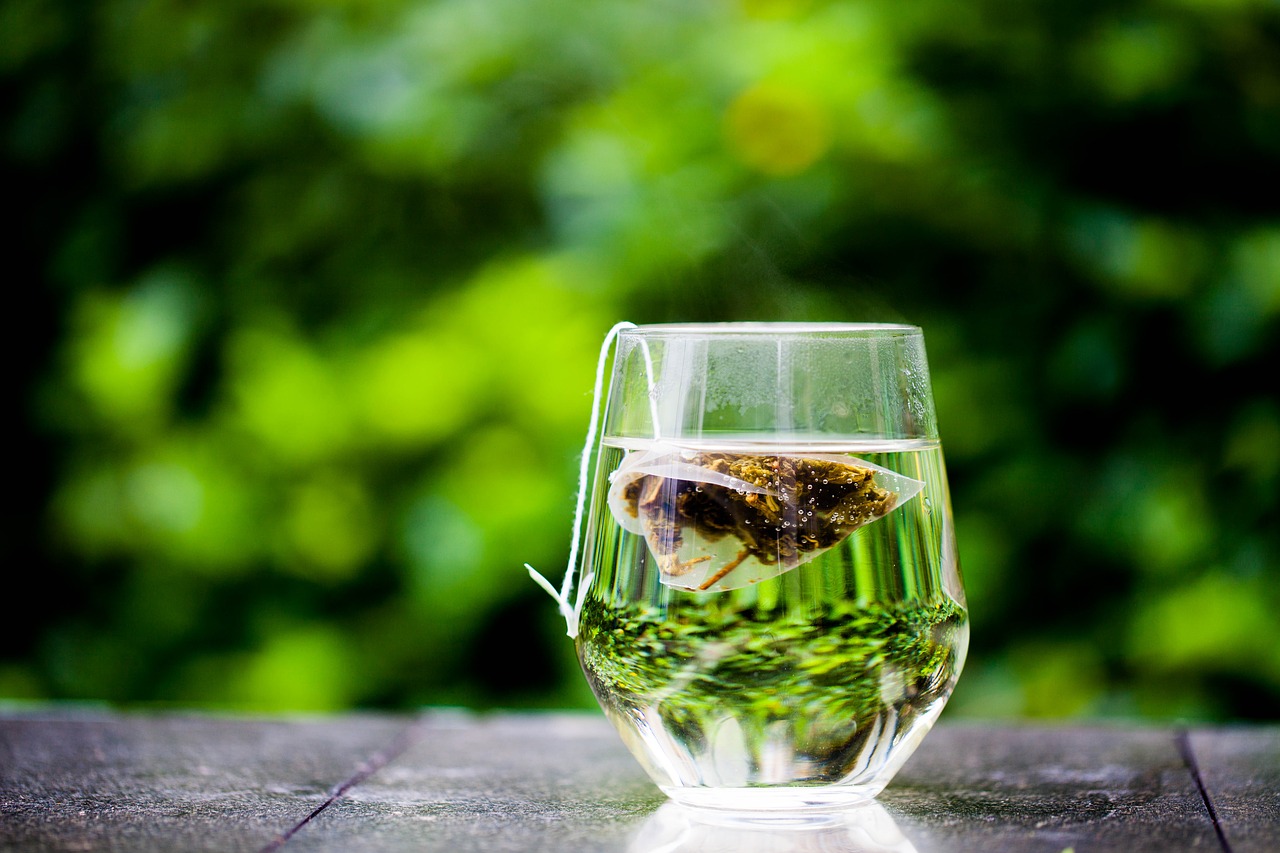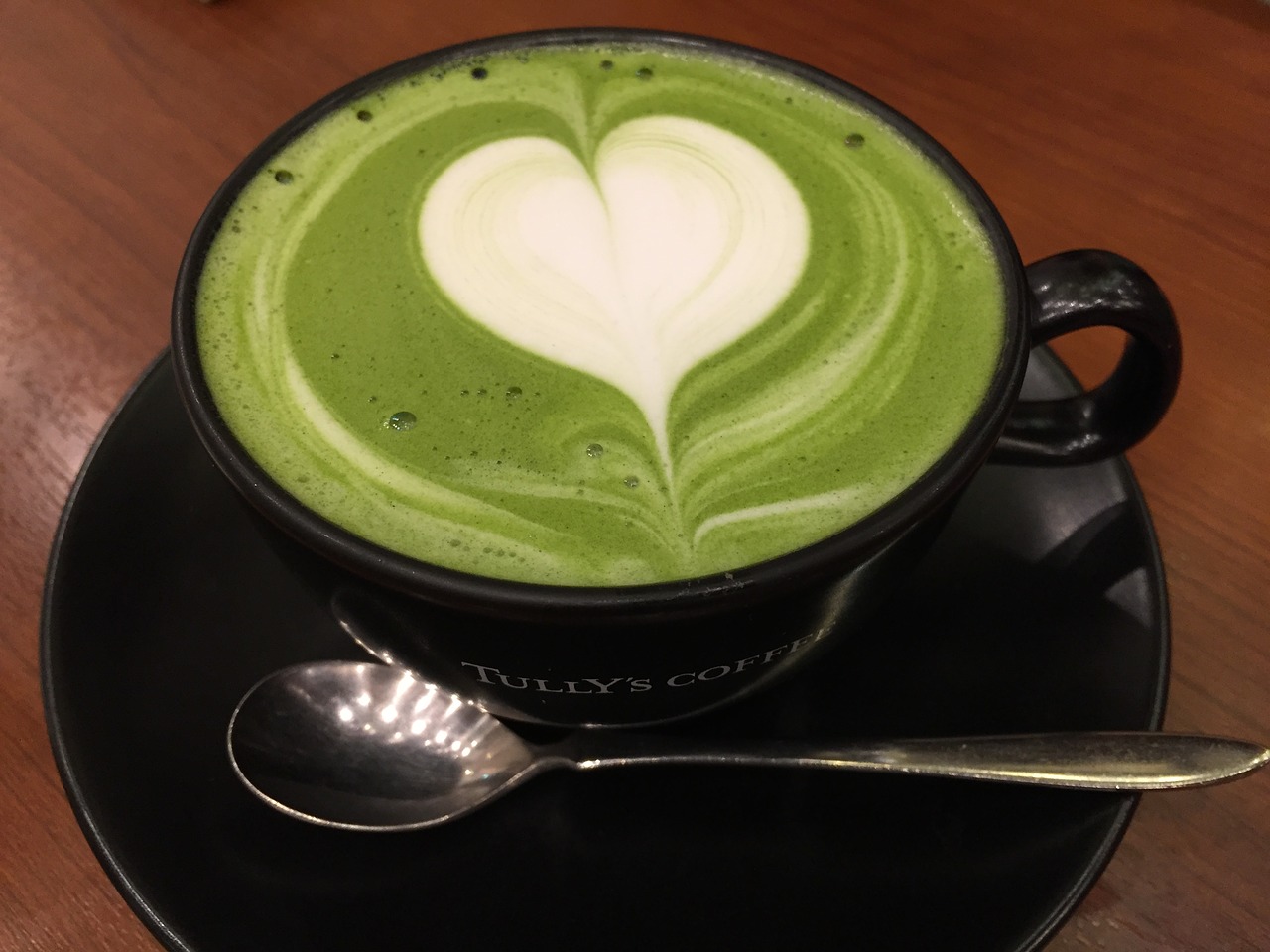Difference Between Green Tea and Matcha
Green tea and matcha are products from the tea industry. They originate from the same plant, the Camellia Sinensis bush. However, their textures and flavors are different because of the way they are produced. Green tea goes through a longer growth period and its leaves are left in the sun. Matcha leaves are more protected and kept under shade cover to increase the amount of chlorophyll in the leaves. This growth period under cover also allows amino acid levels of matcha tea leaves to increase. Green tea is manufactured and produced as a tea bag, while matcha comes in the form of a powder. When they are brewed, and made to produce tea, they both have a grass like undertone to taste, but matcha has a richer, almost buttery flavor. The difference therefore is in the growth, manufacture and presentation of each tea product.

All about green tea?
Green tea is well known as a flavor of tea. It is a very healthy drink. It contains Ant-bacterial properties as well as anti inflammatory and anti diabetic properties These properties, together with hypocholesterolemic elements, help to uplift various organs of the body. Green tea can act as a detoxifier and will improve digestion. The combination of l-thiamine and caffeine improves the brain’s function. Anti oxidants in green tea reduce the risk of cancer. Green tea contains caffeine to boost the metabolic rate and catechin found in green tea reduces skin problems like acne. Green tea can improve dental health. Green tea leaves are dried and presented in a tea bag for convenience. The tea from green tea bags is affordable, but not as concentrated when it is finally produced, as matcha.
What are the benefits of drinking green tea?
- Overall health benefits: Green tea contains many heath giving properties to enhance the general well-being of the body. The anti bacterial and anti inflammatory contents are helpful for many different ailments. Green tea helps reduce body aches and pains and the tea contains anti mutagenic properties. Research into the effects of anti mutagenics is ongoing as scientists work towards finding ways to counteract the effects of mutagens. An important part of caner research is linked to the effects of mutagens. Mutagens cause changes in the genetic material of an organism and finding anti mutagenic compounds in green tea is a valuable natural resource in health care.
- Anti-aging properties: The catechin in green tea acts as a natural anti oxidant and prevents cell damage. This property fights wrinkles by increasing cell turnover and helping to reactivate dying skin cells. Cognitive function and memory loss are also improved by the consumption of green tea. The aching joints attributed to aging are relieved through the additional poly-phenol found in green tea.
- Detoxifying advantages: Green tea neutralizes the effects of free radicals due to the powerful anti oxidant called epigallocatechin gallate or EGCG. Green tea helps the liver detoxify from damaging substances such as alcohol and at the same time green tea boosts the immune system. Green tea decreases the amount of bad bacteria in the digestive system.
- Skin problems solved: The photo-protective polyphenols found in green tea help to prevent skin damage that is caused by the sun. In addition the catechin in green tea can reduce skin problems like acne and the catechin compounds are able to reduce blemishes on the skin.
- Dental health: Green tea is able to reduce oral bacteria and as a result promote the health of teeth and gums. Green tea encourages a healthy balance of falvonoides in the mouth and reduces inflammation that would lead to periodontal disease.

All about matcha.
Matcha is also a product of the plant known as camellia sinensis. However the process to produce matcha is different from the process to grow green tea. Matcha requires more under cover shade to encourage chlorophyll and the amino acid levels of the leaves. Matcha has a rich buttery flavor and the leaves are ground into a powder. Matcha is far more concentrated than green tea. When you drink matcha you are consuming the entire leaf as it is ground into powder while green tea is brewed and the tea drink that results from the brewed leaf is the tea that is consumed. Matcha has the same health benefits as green tea but they are in a far stronger concentrated powder. Matcha has ten times the nutritional value compared to green tea and up to 137 times the amount of anti oxidants than green tea. Matcha is stone ground to turn it into a powder with a traditional stone mill. This process keeps matcha free from artificial colors and flavorings.
What are the benefits of drinking matcha?
- Overall health benefits, including all the areas that green tea covers:
What ever green tea can do, matcha can do better. Matcha has all the same health giving properties and the ability to boost a healthy body and mind. Matcha helps with anti aging and with skin problems. Matcha improves cognitive skills and is a detoxifying agent as well as helping to improve dental health.
Differences between Green Tea and Matcha
- Growing the teas. Green tea and matcha originate from the same plant, the camellia sinensis. Green tea is grown out in the sun and picked and dried into green tea leaves. Matcha is grown in sheltered conditions and the fresh young shots are used to make a powdered version of the tea. A more powerful and potent tea.
- Manufacture and production of the two teas. Green tea leaves are dried and presented in a tea bag. The tea bag is immersed in water at 212o F and the tea flavor is infused into the water then is ready to drink. Matcha is a powder and can be added to water or to smoothies as a health drink. It’s powdered form makes it far more concentrated. It should not be boiled because this destroys some of the properties in the tea. Matcha powder enables the whole tea leaf to be consumed.
- Properties and health benefits. Green tea and matcha have similar properties, the difference is matcha is far more concentrated and offers a more concentrated form of all the beneficial elements. Ten cups of green tea are equal to one cup of matcha.
- Preparation and enjoyment. Green tea is simply prepared in a tea bag immersed in boiling water. The tea liquid is ready to drink as a refreshing tea with or without milk and sugar. Matcha is more versatile and can be added to other drinks or foods and is a very healthy smoothie option. The powder should not reach a boiling or high temperature as this destroys some of the goodness.

Summary:
- Green tea and matcha are both products of the same plant but grown and manufactured differently according to the desired outcome. A green tea of leaves in a bag or a powder form of a very healthy tea product.
- Green ea and matcha are both healthy options with benefits attributed to the powerful anti oxidant Epigallo catechin gallate and other health giving properties.
- The properties in green tea and matcha help with a number of anti aging strategies including cognitive awareness, skin and organ health as well as possessing the ability to get rid of free radicals in the body and help with digestive problems and dental health care.
- Green tea is generally more affordable and public awareness of the benefits of green tea is growing. Matcha is more expensive and in its powdered form gives a more concentrated product. People are becoming more aware of the value of matcha and how versatile it is as it can be used on other foods and drinks for ten times the health benefits.
- Difference Between Lagoon and Bay - October 20, 2021
- Difference Between Futurism and Preterism - August 12, 2021
- Difference Between Dichotomy and Paradox - August 7, 2021
Search DifferenceBetween.net :
1 Comment
Leave a Response
References :
[0]Image credit: https://pixabay.com/de/photos/matcha-grüntee-latté-herz-2683990/
[1]Image credit: https://pixabay.com/de/photos/tee-tasse-green-teebeutel-im-freien-1872026/
[2]Falcore Irene. The Difference between green tea and matcha. 23/03/2016. www.noursihedlife.com.au/article/154906.pub.BWXDigital Pty Ltd. Reviewed 16/07/2019
[3]Da Costa Aldrid. The difference between green tea and matcha. 8/03/2018. www.teatrunk.in/blogs/editorial/difference between green tea and matcha. Pub.teatrunk. Reviewed 16/07/2019
[4]Link Rachael. 7 Health benefits of matcha tea. 10/10/2017. www.healthline.com.pub Healthline media. Reviewed 17/07/2019.

Uhh green tea doesn’t only come in a bag? Ever hear of loose tea? In addition, “green tea” is a broad term that includes thousands of varieties. Obviously written by someone who doesn’t know anything about tea.